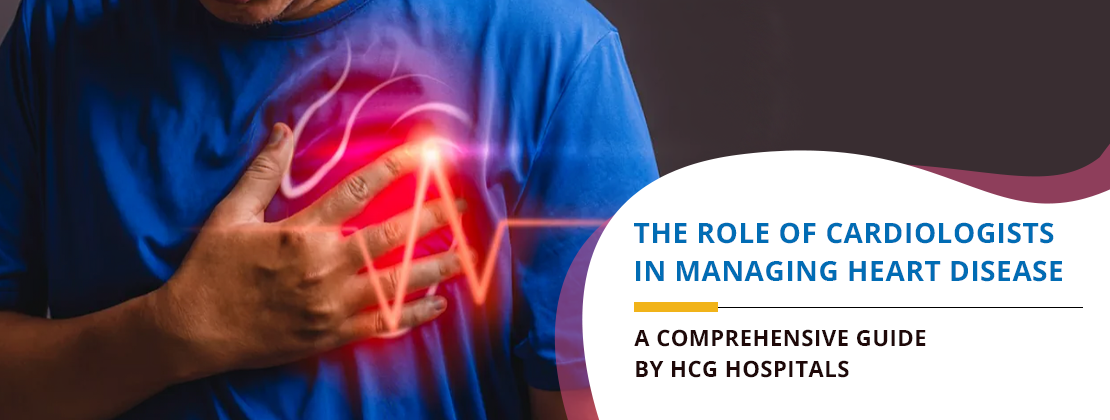
Home / Blog / The Role of Cardiologists in Managing Heart Disease: A Comprehensive Guide by HCG Hospitals
Heart disease is a significant global health concern, and effective management is crucial for patients’ well-being. In this comprehensive guide, we will explore the vital role of cardiologists in managing heart disease and promoting cardiovascular health. Discover the expertise of the best cardiologists at HCG Hospitals, renowned for their dedication to providing high-quality care and innovative treatments.
Table of Contents
Cardiology is a specialized branch of medicine that focuses on the diagnosis, treatment, and prevention of heart diseases. It encompasses a wide range of conditions, including coronary artery disease, arrhythmias, heart failure, and valvular disorders. Cardiologists undergo extensive training to become experts in managing heart-related conditions and are at the forefront of advancements in cardiology treatments.
Cardiologists play a pivotal role in managing heart disease throughout the patient’s journey. They conduct thorough assessments, including medical history reviews, physical examinations, and diagnostic tests, to accurately diagnose heart conditions. Based on their expertise, cardiologists develop personalised treatment plans tailored to each patient’s needs, ensuring optimal outcomes and improved quality of life.
Regular cardiology check-ups are essential for individuals with existing heart conditions or those at risk of developing heart disease. Cardiologists monitor heart health, assess risk factors, and make necessary adjustments to treatment plans. These check-ups enable early detection of potential issues, prevention of complications, and timely intervention.
Cardiologists are experienced in managing various heart conditions and disorders. These include coronary artery disease, hypertension, heart rhythm disorders (arrhythmias), heart valve diseases, congenital heart defects, and heart failure. They utilize their specialized knowledge and skills to provide accurate diagnoses and comprehensive treatment options for each condition.
Preventing heart disease is a primary focus of cardiologists. They educate patients on lifestyle modifications and preventive strategies to reduce the risk of heart disease. These include maintaining a heart-healthy diet, engaging in regular exercise, managing weight, quitting smoking, and controlling blood pressure and cholesterol levels. Cardiologists work closely with patients to implement these measures and prevent the development or progression of heart disease.
Cardiologists employ a range of treatments and interventions to manage heart disease. These include medication management, lifestyle counselling, cardiac catheterization procedures, angioplasty, stenting, pacemaker implantation, electrophysiology studies, cardioversion, and bypass surgery. Cardiologists stay abreast of the latest advancements in cardiology treatments to offer the most effective and innovative options to their patients.
Advancements in technology have revolutionized the field of cardiology. Cardiologists utilize advanced imaging techniques, such as echocardiography, cardiac CT scans, and cardiac MRI, to obtain detailed images of the heart. Additionally, advancements in implantable devices, such as pacemakers and defibrillators, have greatly improved patient outcomes. The integration of technology in cardiology continues to enhance the precision, effectiveness, and safety of treatments, ensuring better outcomes for patients with heart conditions.
Cardiologists understand the importance of collaboration in providing comprehensive care to patients. They work closely with a multidisciplinary team of healthcare professionals to ensure holistic management of heart diseases. This collaborative approach involves coordinating with primary care physicians, cardiac surgeons, interventional radiologists, cardiac rehabilitation specialists, and nutritionists. By sharing knowledge, expertise, and insights, these professionals collectively address the various aspects of heart health, leading to improved patient outcomes and better overall care.
Selecting the right cardiologist is crucial for effective heart disease management. When choosing a cardiologist, consider factors such as their expertise, experience, credentials, patient reviews, and hospital affiliations. Look for a specialist who demonstrates a patient-centred approach, effective communication skills, and a commitment to personalized treatment plans. By selecting the best cardiologist for your specific needs, you can have confidence in receiving high-quality care and achieving optimal heart health outcomes.
In conclusion, cardiologists play a critical role in managing heart diseases and promoting cardiovascular health. Through the utilization of advanced technologies, they can diagnose and treat heart conditions with greater precision and effectiveness. Collaborating with other healthcare professionals allows for a comprehensive and holistic approach to patient care. By choosing the best cardiologist who meets your specific needs, you can ensure personalized treatment and better outcomes. Trust the expertise of cardiologists at HCG Hospitals to receive the highest standard of care and support in your heart health journey.
A cardiologist is crucial for diagnosing, treating, and managing heart disease through assessments, personalised treatment plans, and follow-ups to ensure optimal patient health.
At HCG Hospitals, cardiologists use advanced diagnostic tests and assessments like echocardiograms, MRIs, and physical examinations to accurately diagnose heart conditions.
Cardiologists at HCG Hospitals offer a variety of treatments including medication management, surgical interventions, and lifestyle counselling to effectively manage heart conditions.
Regular check-ups help in early detection and management of potential heart issues, ensuring timely interventions and preventing complications.
Yes, cardiologists often recommend lifestyle changes such as diet adjustments, regular exercise, and quitting smoking to help manage heart disease.
HCG Hospitals employs state-of-the-art technologies like cardiac catheterization, pacemakers, and advanced imaging techniques to enhance treatment accuracy and patient care.
Treatment plans are personalised based on the patient’s specific condition, medical history, and health needs, ensuring targeted and effective care.
Educating patients about their condition and treatment plan is vital for compliance and effectiveness, helping them to make informed health decisions.
HCG Hospitals ensures comprehensive care by integrating a multidisciplinary approach involving dietitians, rehab specialists, and primary care doctors to address all aspects of heart health.